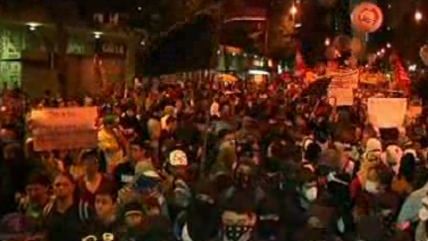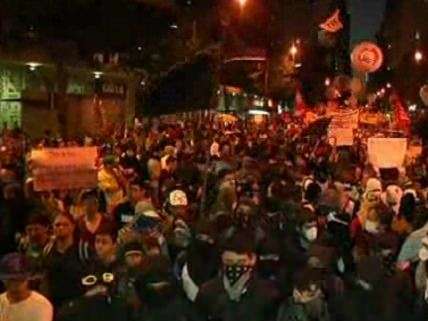Brazil Protests Challenge Establishment Political Parties and Social Movements
Not so easy to define


Demonstrations that began in June as protests against a bus fare increase in Sao Paolo continue throughout Brazil, and the effort in Brazil and outside of it to define their make-up and goals also continues.
An article in the Boston Review by Ana Claudia Texeira and Gianpaolo Baiocchi looks at some of the tensions between demonstrators and the Brazilian institutions and organizations trying to define or even co-opt them, including political parties like the ruling Worker's Party, but also so-called "traditional movements" (like labor unions and other largely left-wing groups):
Traditional movements have a distant and cautious relationship with the recent protests. Some organized movement leaders, from the protests' early days, have expressed suspicion at both the middle-class component and the distrust of political parties that pervades the June Movement, a supposed "fascist tendency." Some traditional organizers claim they see evidence of right-wing manipulation in the protests and that the demonstrators are privileged people who do not understand the importance of a leftist government.
But other organizers have attempted to more centrally and visibly insert their movements into the broader wave of protests. Several of the large unions, in concert with some nationally organized movements, called for a "National Day of Struggle" on July 11, which included a general strike. The demands—for political reform and greater spending on health and education—were consonant with the concerns of the protesters.
Still, the strike, more than anything, showed the distance between traditional movements and recent protesters. Services stopped in some cities, but street protests were muted.
The whole thing's worth a read and provides a good understanding of the complexity of the forces at play in Brazil's protests. For a pessimistic view from a Brazilian economist on the protesters' chances at political success, read this. Jesse Walker explained last month how decentralized protests in Brazil and elsewhere around the world are befuddling traditional centralized power structures.
Editor's Note: As of February 29, 2024, commenting privileges on reason.com posts are limited to Reason Plus subscribers. Past commenters are grandfathered in for a temporary period. Subscribe here to preserve your ability to comment. Your Reason Plus subscription also gives you an ad-free version of reason.com, along with full access to the digital edition and archives of Reason magazine. We request that comments be civil and on-topic. We do not moderate or assume any responsibility for comments, which are owned by the readers who post them. Comments do not represent the views of reason.com or Reason Foundation. We reserve the right to delete any comment and ban commenters for any reason at any time. Comments may only be edited within 5 minutes of posting. Report abuses.
Please to post comments


And you guys are sure this isn't just Carnival?
It's not, but there is pretty much no reason that the Brazilians will not use to get in the streets and have a big party. Carnival, Futebol, Protests, whatever.
festejando apenas no Brasil
did my google translator work right?
That's 'I'm only partying in the Brazil'.
But I am not sure that a Brazilian would say it like that. That's the thing about the translator, you get the correct words, but maybe it's not what a native speaker would say.
I would probably say something more like:
Eu tenho uma festa no Brasil
I'm having a party in Brazil, because I've never actually heard a Brazilian use the term partying, like we do here in the USA.
You could say 'Estou festejando', but I still haven't heard anyone there say it that way.
A Brazilian co-worker offers this:
T? na gandaia!
Which Google translate has as "I'm carousing!"
Yeah, sure that's what it means. Is your co-worker snickering behind your back now?
Brazils constitution is not all that great. Ours is much better.
The thing is, most of the Brazilian people still care about what is in it and whether or not their government is abiding by it.
Here in the US, I think a majority of us have now lost site of the fact that our government no longer respects our constitution at all. They defy it daily and act like it's a non-issue. You even have people calling for it's repeal, so that the president can behave like a dictator.
Sounds like they're asking for free stuff.
Some of the are. Just like here, they are a diverse group.
But most of them actually seem more upset about corruption than anything else.
This is pretty accurate.
most of them actually seem more upset about corruption than anything else.
Well then... they must be "privileged people who do not understand the importance of a leftist government.""
Well, I will have to admit, most or all of the Brazilians I talk to are either privileged or at least pretty well off. I don't go to the favelas much to have political conversations.
one of my best friends in college was a super-rich kid from Sao Paulo
i called him, "the brazillionaire"
Changing "protests" in that headline from a noun to a verb changes the meaning.
Personally, I think they need to say "challenge" rather than "challenging". Its profoundly ambigous as it is.
Hah!
What the...?
It's pretty surprising and hopeful that they've been protesting profligate spending on soccerfootball, the olympics, and the pope's visit and tariffs and inflation:
Prices Fuel Outrage in Brazil, Home of the $30 Cheese Pizza
I was blown away by the prices when I visited a few years ago. People seem to buy everything on installment plans, even things like books or kitchenware.
Yeah, they have this thing were you can divide payments 10 times. My wife was surprised when she found out that we don't have that here, unless you're paying interest, or layaway in come cases.
The prices of electronics, clothing, cars, and a lot of things in Brazil, is crazy. Only people who are fairly wealthy can afford any of that stuff.
I wish the government would so something about that, like stop charging outrageous tariffs to bring stuff into the country, so that I can go there with one bag, and not have to have 3 to take all of the stuff that my family ordered from Amazon because they knew I was coming.
Nice work.